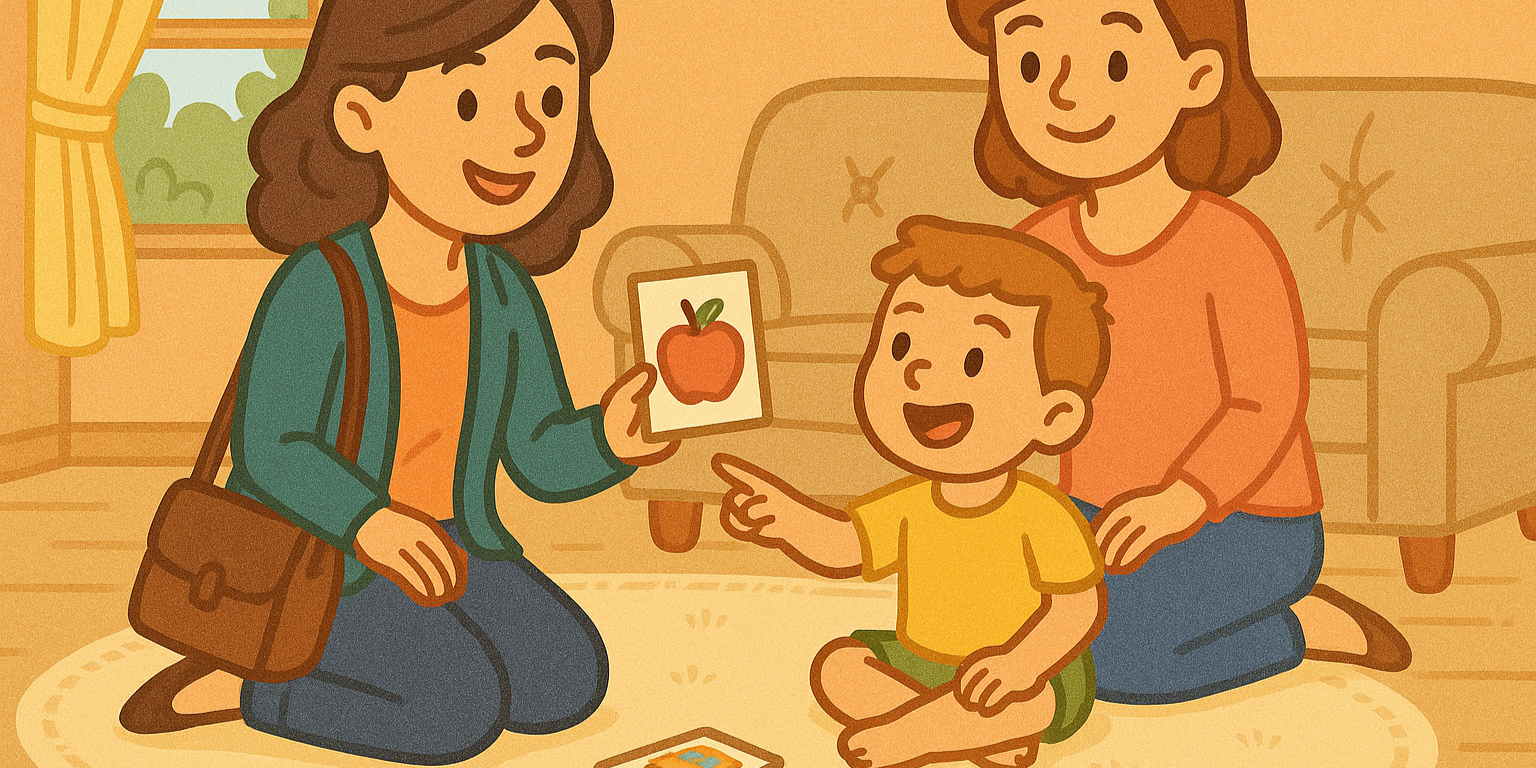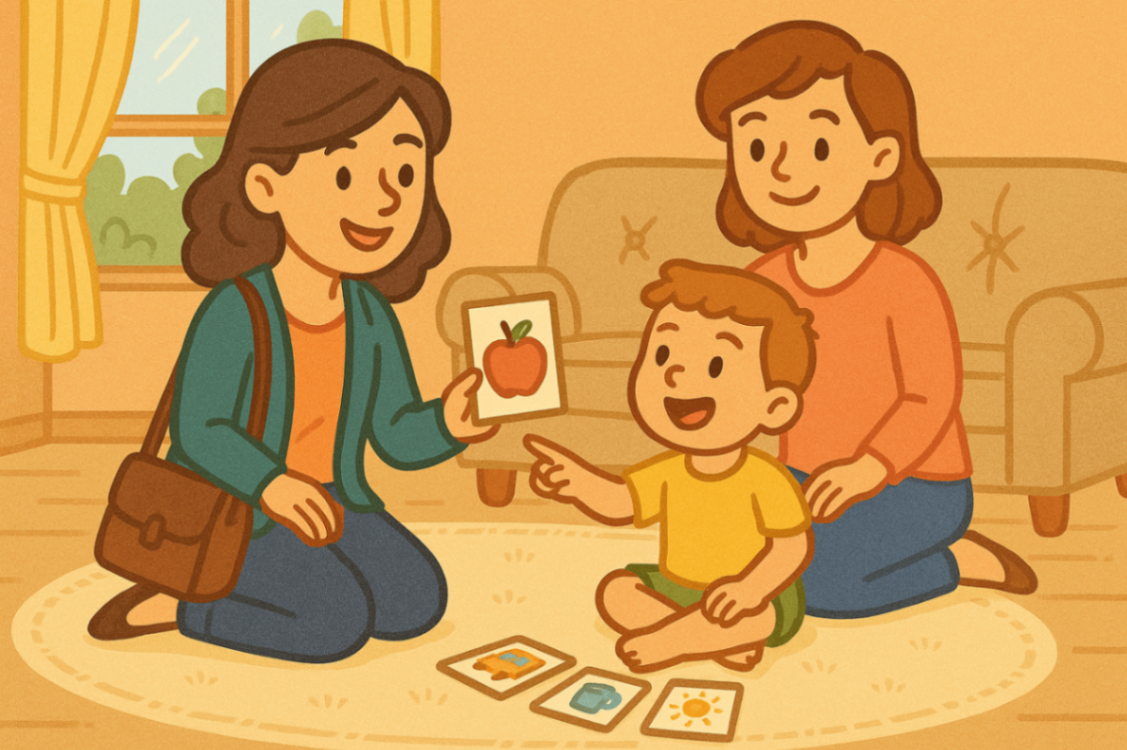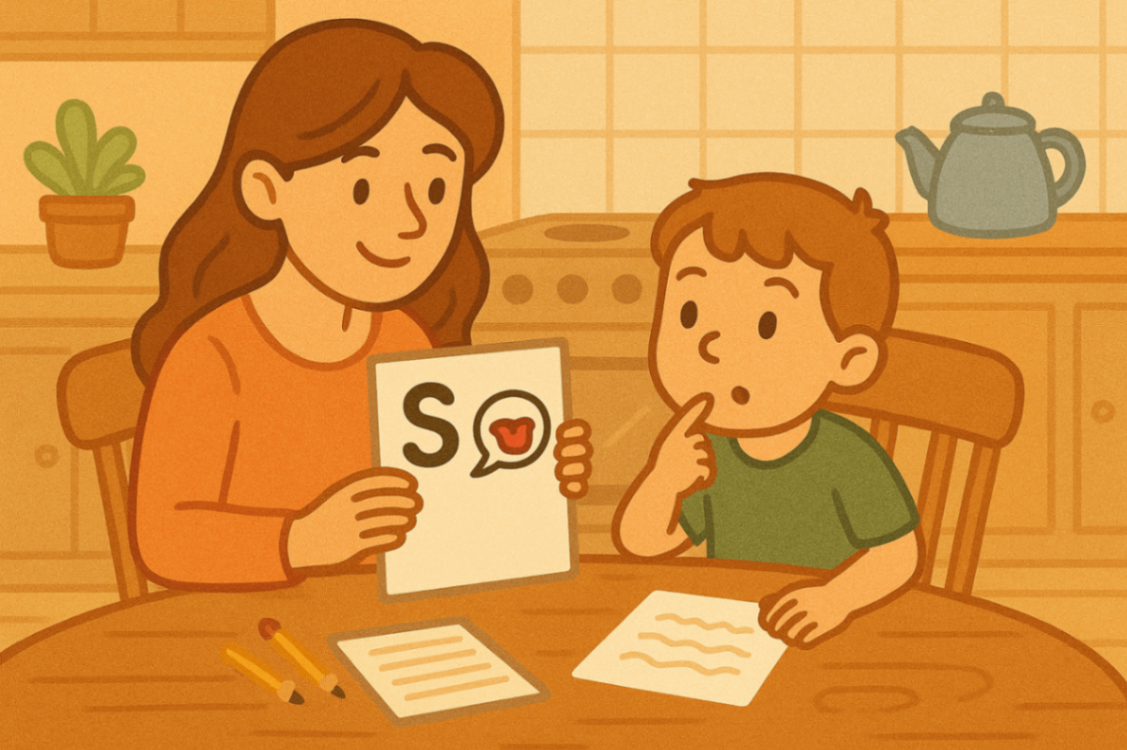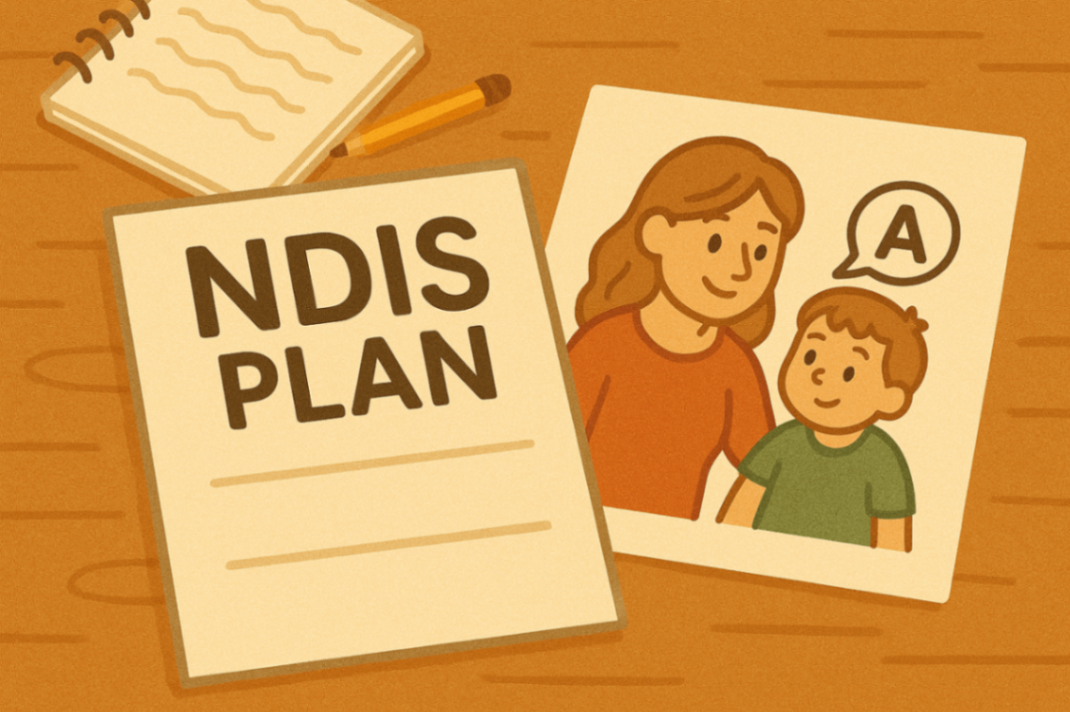
effective strategies for in-home speech therapy liverpool
31 July, 2025
Key Highlights
-
In-home speech therapy Liverpool gives families in Liverpool access to expert speech therapists who tailor therapy services to your unique communication needs.
-
Early intervention accelerates language development and helps young people build vital communication skills for daily life and social settings.
-
Speech therapist home visits increase comfort and remove barriers to accessing therapy, especially for children and those with mobility challenges.
-
Services cover a wide range of speech and language difficulties, ensuring individualised support for each child’s speech journey.
-
Ongoing collaboration between therapists and families results in the best support and measurable progress over time.
Introduction
Starting language therapy can transform your child’s communication skills and open doors to more confident daily interactions. In Liverpool, experienced language therapists deliver support right in your home, making it easier for your child to thrive. Every child’s communication needs are unique, so therapy services are carefully designed to match individual goals and abilities. By working together with your therapist, you’ll empower your child’s communication development and set the stage for success at home, school, and beyond.
NDIS speech therapy Liverpool options ensure that families receive therapy that is accessible, flexible, and aligned with each child’s unique communication challenges. If you’re deciding between therapy approaches, start here: Top Speech Therapy for Autism Strategies and Techniques.
Understanding Speech and Language Challenges in Liverpool

Children across Liverpool often experience a range of communication needs that impact daily life. These can include difficulty understanding language, expressing thoughts clearly, or socialising with peers. Many families seek support to improve their child’s quality of life and language development, knowing early help makes a real difference.
Communicating well is vital for learning and building friendships. Unaddressed challenges can slow progress at school and affect confidence. NDIS speech therapy in Liverpool addresses these hurdles head-on, offering practical solutions and ongoing encouragement. Looking for an overview of the first therapy session? Discover how to prepare and what to expect in our guide: Your Child’s First Session: Speech Therapy Liverpool Guide.
Common Speech and Language Difficulties Addressed by In-Home Therapy
In-home speech pathology provides targeted support for many communication needs faced by children and families in Liverpool. Speech therapists routinely help with:
-
Speech sound disorders: Children may have trouble pronouncing certain sounds, affecting how easily they are understood.
-
Language delays: Some kids find it difficult to build vocabulary, use correct grammar, or form sentences on par with peers.
-
Stuttering: Disruptions in the natural flow of speech can lead to frustration or reluctance to speak.
-
Social communication challenges: Difficulty picking up on nonverbal cues or understanding conversational rules.
-
Autism speech therapy Liverpool support for children using alternative communication systems
Speech pathologists also address swallowing issues and work with children on the autism spectrum who benefit from alternative communication methods, such as AAC devices. By providing therapy in familiar settings, language therapists foster comfort and maximize each child’s speech and language development.
Not sure if your child needs speech therapy yet? Learn the early signs and when to seek help in our article: Early Signs Your Child Needs Speech Therapy Liverpool.
How These Challenges Impact Children and Families
Communication difficulties touch every part of a child’s life. At home, a child struggling to express needs may become frustrated or withdrawn. This can strain relationships between siblings and caregivers.
In school settings, language barriers may hinder learning and participation. Children might shy away from group activities or fall behind in reading and writing. Social skills also take a hit—kids can feel left out when they’re unable to join conversations or make friends easily.
For families, daily routines may require extra patience and creative communication. Access to speech pathology services can ease stress, offering tools and strategies that boost confidence and independence. Over time, the right support improves quality of life for both children and their caregivers, helping everyone thrive.
Choosing the Right Speech Therapist for Home Sessions

Selecting the best therapist is crucial to long-term progress. Look for registered professionals who deliver NDIS speech therapy Liverpool services with tailored approaches, particularly for children with complex needs such as autism.
What to Consider When Selecting a Therapy Provider in Liverpool
Finding a quality speech therapist requires careful thought. Keep these factors in mind:
-
Qualifications: Make sure your therapist is certified by Speech Pathology Australia and experienced in your child’s specific communication needs.
-
Experience: An experienced team of speech pathologists can adapt therapy plans to fit children and adults, ensuring the best outcomes.
-
Approach: Look for a provider who takes time to explain every step and involves you in decision-making.
-
Flexibility: The ability to provide therapy in a range of settings—home, school, or via telehealth—shows real commitment to your convenience and comfort.
It’s wise to read reviews, ask for references, and discuss how progress will be measured. “Success comes from a partnership between therapists and families,” says Dr. Victoria Evans, Speech Pathologist. Ensuring qualifications and clear communication will help you access effective speech pathology services in Liverpool. Interested in NDIS funding for speech therapy at home? We’ve broken down the full process in our parent-friendly explainer: How to Access NDIS Speech Therapy Liverpool.
Accessing In-Home Speech Therapy Services in Liverpool
Getting started with in-home therapy services in Liverpool is straightforward. Most clinics or independent speech therapists offer a simple referral process, guiding you from initial contact through assessment and ongoing sessions. Services are available in a range of settings—from home to school—making it easy to fit therapy into your child’s routine.
Liverpool speech therapy providers often support nearby suburbs and offer mobile visits for families with transportation or mobility challenges. This accessibility ensures every child’s communication needs are met with expert care.
daar delivers in-home speech therapy services across Liverpool, Casula, Moorebank, Prestons, Lurnea, Wattle Grove, and surrounding suburbs.
Private vs Public In-Home Speech Therapy in Liverpool
Choosing between private and public (NHS) options for home-based support significantly impacts a child's communication development. Private speech therapy often provides tailored therapy plans and an experienced team of language therapists, enabling focused attention on individual communication needs. Conversely, NHS services may offer broader access but can sometimes be limited in availability or personalization. Assessing the specific challenges your child faces will guide you toward the best support that enhances their social skills and overall quality of life.
Mobile & Telehealth In-Home Speech Therapy Options in Liverpool
Many Liverpool therapy services offer mobile and remote speech therapy for those who can’t always visit a clinic. This flexibility supports communication development no matter the setting.
-
Mobile speech pathologists travel to homes, schools, or workplaces, ensuring therapy fits your lifestyle.
-
Telehealth appointments are conducted via secure video or phone—perfect for busy schedules or when mobility is limited.
-
Remote services still provide comprehensive assessment, therapy plans, and progress tracking—using the same evidence-based techniques as in-person care.
-
Providers often offer a range of settings, making it easy to transition between face-to-face and virtual sessions as needed.
This wide access removes barriers, making it easier for families to get the support they need for their child’s speech and language development.
Preparing for Your First At-Home Speech Therapy Session

Getting ready for your first appointment with a speech therapist can help your child feel comfortable and confident. Gather notes about their communication development, any previous reports, and favorite toys to ease the session.
Expect your therapist to ask about your child’s daily communication skills and discuss therapy plans tailored to your needs. The initial visit is all about making your child feel at ease and setting up the right support from day one.
What to Expect During the Assessment and Initial Visit
The first stage of at-home speech therapy in Liverpool begins with a thorough assessment. Your speech pathologist will observe and engage your child in a relaxed manner, often using play-based activities to identify specific communication needs and strengths.
You’ll discuss your child’s background, current challenges, and any goals you have for their communication development. The therapist may use formal tests, informal observation, and input from parents or teachers to get a well-rounded picture.
The initial visit ends with a discussion of findings and next steps. You’ll start to see how therapy plans are built to match your child’s abilities and target areas for growth. This session lays the groundwork for future progress and keeps you involved in every step.
Setting Realistic Goals and Creating a Supportive Environment
Creating effective therapy plans means working together to set achievable targets. Your therapist will help you identify areas where your child needs the best support and develop clear goals for progress.
-
Focus on small, manageable steps to build confidence and track growth.
-
Encourage open communication at home—let your child know that mistakes are okay and learning is a process.
-
Set aside regular times for therapy activities, making them a part of your daily routine.
-
Celebrate every win, no matter how small, to motivate continued effort.
A supportive environment involves the whole family. Keeping communication positive and consistent helps reinforce new skills learned in therapy sessions. By working together, you give your child the best possible start on their communication journey.
How to Use Your NDIS Plan for In-Home Speech Therapy in Liverpool
If your child has an NDIS plan, you may be eligible for in-home speech therapy through Capacity Building (Improved Daily Living) or Core Supports. Here’s how:
-
Families who are plan-managed or self-managed can book directly with us.
-
Therapy sessions can be delivered at home, school, or early learning settings.
-
Children under 9 can access early childhood supports without a formal diagnosis.
-
Need help applying or understanding your plan? Our team can guide you step by step.
Effective Strategies to Support Your Child’s Speech Goals at Home
Supporting your child’s speech and language development doesn’t stop at the therapy session. By weaving practical strategies into daily routines, you help strengthen communication skills and reinforce what’s learned.
Take an active role in your child’s progress. Regular practice, encouragement, and a focus on enjoyable daily activities create the best support for your child’s speech goals. Consistent involvement boosts confidence and sets the foundation for lifelong success.
Practical Daily Activities for Enhancing Communication Skills
Simple daily activities make a big difference in communication development. Speech pathology experts recommend these strategies:
-
Read aloud together every day, pointing to pictures and asking questions to build vocabulary and understanding.
-
Encourage turn-taking games, like board games or simple role play, to practice conversational skills and listening.
-
Use mealtimes to talk about the day, describe food textures, and name objects—turning routines into language learning opportunities.
-
Practice speech exercises assigned by your therapist, keeping sessions short and fun.
Mixing these activities into your routine supports social skills and helps your child feel at ease with their language development. Your involvement is key—children learn best when communication skills are reinforced in positive, everyday situations.
Conclusion
In conclusion, supporting your child's speech goals at home is an invaluable part of their communication development. By implementing effective strategies—such as incorporating practical daily activities, creating interactive environments, and collaborating closely with your chosen speech therapist—you can significantly enhance your child's progress. Remember, consistent practice and encouragement are key to building their confidence and skills.
Start In-Home Speech Therapy in Liverpool Today. Ready to support your child’s communication development at home? We deliver personalised, NDIS-funded in-home speech therapy in Liverpool and surrounding suburbs like Casula, Moorebank, and Prestons.
Frequently Asked Questions
How long does a typical course of in-home speech therapy last?
Therapy plans vary, but most courses last several months with weekly or biweekly sessions. Session duration and overall length depend on your child’s communication needs and progress toward set goals. Regular check-ins with your therapist ensure the best outcomes and a positive impact.
Are funding options or insurance available for private speech therapy in Liverpool?
Yes, private speech therapy may be covered by NDIS funding, some health insurance policies, or other funding options. Liverpool speech therapy providers can guide you through eligibility and claims to help minimize costs while ensuring access to vital therapy services.
Can adults benefit from in-home or mobile speech therapy services?
Absolutely. Adults experiencing speech, voice, or swallowing difficulties can access speech pathology services at home. These services help improve communication skills, quality of life, and social skills, addressing issues from stroke recovery to neurological conditions and beyond.
.svg)

















